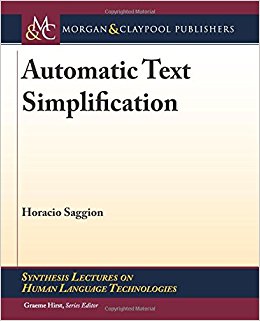What does text simplification offer us?
A book by Horacio Saggion, a member of the Natural Language Processing Research Group, analyses the trends in this field and sketches out several future social applications.
 Thanks to the large number of texts available free on the Internet the information and knowledge available to the general public has increased exponentially.
Thanks to the large number of texts available free on the Internet the information and knowledge available to the general public has increased exponentially.
However, the way a text is worded (its vocabulary, syntax...), may make reading and understanding it difficult for many people, especially those with a low degree of literacy, with language disorders or with a limited knowledge of the language of the text.
Texts containing unusual words or long and complicated sentences can be difficult for people to read and understand, and difficult for machines to analyse.
Horacio Saggion, coordinator of the Large Scale Text Understanding Systems Lab and researcher of the Natural Language Processing Research Group (TALN) at the Department of Information and Communication Technologies (DTIC), has just published Automatic Text Simplification, a collection of the research conducted so far in the field of text simplification that explores the main topics under study in this field: automatic evaluation of legibility, lexical simplification, syntactic simplification...
The book, published by Morgan & Claypool, also provides a detailed description of the machine learning techniques that are being used today in the field of simplification, describes complete systems designed for specific languages and specific audiences, and offers resources for research and development in this field, along with techniques for evaluating text simplification.
A field of research with multiple social applications
 Machine simplification of texts is the process of transforming one text into another that conveys the same message, but is much easier for a wider audience to read and understand.
Machine simplification of texts is the process of transforming one text into another that conveys the same message, but is much easier for a wider audience to read and understand.
Normally, the procedure involves changing difficult or unknown phrases for other simpler equivalents and transforming long syntactically complex sentences into shorter less complex ones.
Research into automatic text simplification began twenty years ago, and has now managed to gain a central role in research related to natural language processing, not only due to the challenges it involves, but also because of the social implications it might have.
